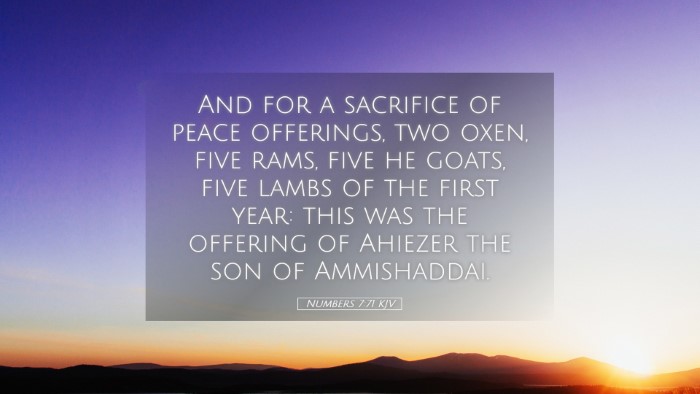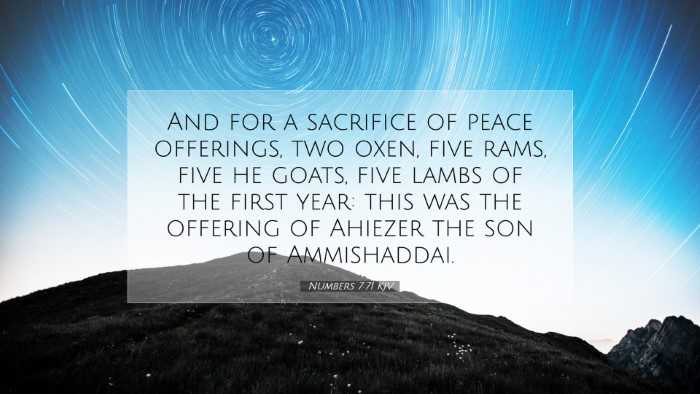Commentary on Numbers 7:71
Verse Context: Numbers 7:71 states, "His offering was one silver charger, the weight whereof was an hundred and thirty shekels, one silver bowl of seventy shekels, after the shekel of the sanctuary; both of them were full of fine flour mingled with oil for a meat offering."
Introduction
This pivotal verse is nestled within the broader narrative of the consecration of the tabernacle and offerings by the leaders of Israel. It represents not only the obedience and dedication of the tribal leaders but also the importance of sacrificial offerings in the biblical tradition.
Insights from Matthew Henry
Henry emphasizes the need for meticulous detail in worship and offerings. He highlights that the items presented were significant both in weight and in spiritual symbolism. Each offering not only served a practical purpose but also reflected the intentions and devotion of the giver.
- Weight of Offerings: The specific weights (130 shekels and 70 shekels) are mentioned to underline the value placed on these offerings. Henry notes that such details are not merely incidental but serve as reminders of God’s expectation of excellence and sincerity in worship.
- Fine Flour and Oil: The use of fine flour mingled with oil speaks to the richness and quality of what was offered to God. It symbolizes the best that the people had to present before the Lord, a principle that resonates in the theology of offerings throughout Scripture.
Albert Barnes' Perspective
Barnes contributes to the understanding of the offerings by suggesting that they were meant to atone and express gratitude to God. The use of “meat offering” signifies a deeper communion with God, as offerings often represented a relational interaction between God and His people.
- Symbolism of Silver: Barnes notes that silver is often associated with redemption. This offering may thus signify a deeper understanding of the Israelites’ relationship with God, hinting at redemption themes that culminate in the New Testament.
- Community and Leadership: The communal aspect of these offerings by tribal leaders builds a foundation for corporate worship practices in Israel. Barnes highlights that such leaders have a responsibility to set an example for the people in their devotion and offerings.
Insights from Adam Clarke
Clarke delves into the historical significance of the offerings. He draws on the broader context of the wilderness wanderings and the Israelites’ journey toward their Promised Land, illustrating how these offerings were a crucial part of their identity and mission as a nation set apart by God.
- Purpose of Offerings: Clarke interprets these offerings as not merely ritualistic acts but as essential expressions of the covenant relationship between God and Israel. They were a means of recognizing God's provision and authority in their lives.
- Role of Leaders: He underscores the vital role of leaders in spiritual matters. Their offerings served as a public affirmation of their dedication to God and their leadership responsibilities, establishing a spiritual standard among the people.
Theological Reflections
As we engage with Numbers 7:71, it becomes evident that the act of offering is steeped in theology that transcends time and culture. The details of the offering resonate with key themes such as:
- Commitment to God: The painstaking attention to detail calls believers today to consider what they present to God in worship and service.
- Community Worship: The collective nature of the offerings stresses that worship is not isolated but a corporate endeavor, reflecting the community of faith.
- Excellence in Service: The emphasis on quality shows that God is worthy of the best we can give, challenging contemporary believers to reflect on their own sacrificial lives.
Conclusion
Numbers 7:71 serves as a microcosm of the greater narrative of Israelite worship and community life. The insights from Matthew Henry, Albert Barnes, and Adam Clarke enrich our understanding of this passage, inviting us to reflect on our own acts of worship. As we consider the offerings made by Israel’s leaders, let us also examine the content, quality, and intention of our offerings before God, that we may honor Him in all aspects of our lives.


